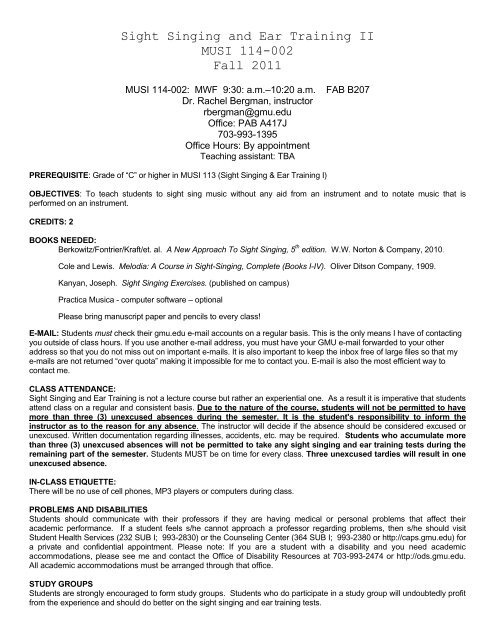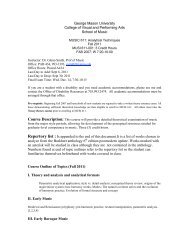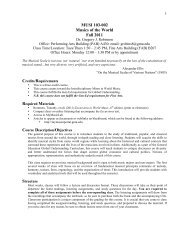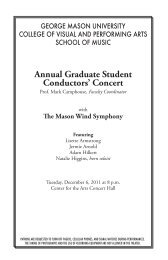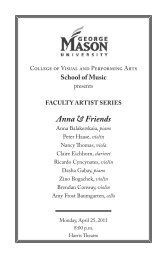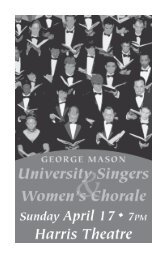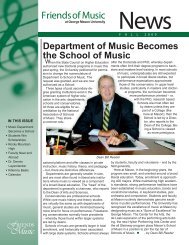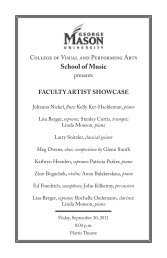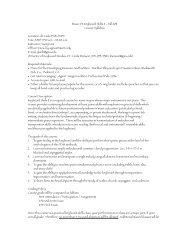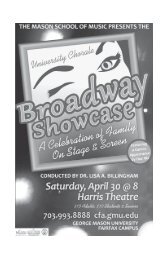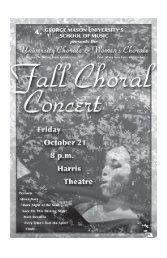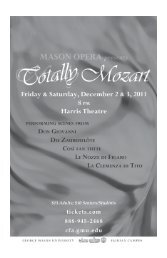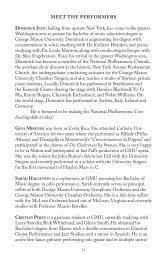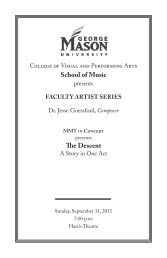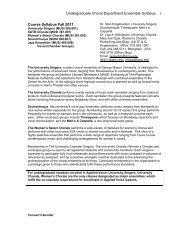Sight Singing/Ear Trn II - George Mason University School of Music
Sight Singing/Ear Trn II - George Mason University School of Music
Sight Singing/Ear Trn II - George Mason University School of Music
You also want an ePaper? Increase the reach of your titles
YUMPU automatically turns print PDFs into web optimized ePapers that Google loves.
<strong>Sight</strong> <strong>Singing</strong> and <strong>Ear</strong> Training <strong>II</strong><br />
MUSI 114-002<br />
Fall 2011<br />
MUSI 114-002: MWF 9:30: a.m.–10:20 a.m. FAB B207<br />
Dr. Rachel Bergman, instructor<br />
rbergman@gmu.edu<br />
Office: PAB A417J<br />
703-993-1395<br />
Office Hours: By appointment<br />
Teaching assistant: TBA<br />
PREREQUISITE: Grade <strong>of</strong> “C” or higher in MUSI 113 (<strong>Sight</strong> <strong>Singing</strong> & <strong>Ear</strong> Training I)<br />
OBJECTIVES: To teach students to sight sing music without any aid from an instrument and to notate music that is<br />
performed on an instrument.<br />
CREDITS: 2<br />
BOOKS NEEDED:<br />
Berkowitz/Fontrier/Kraft/et. al. A New Approach To <strong>Sight</strong> <strong>Singing</strong>, 5 th edition. W.W. Norton & Company, 2010.<br />
Cole and Lewis. Melodia: A Course in <strong>Sight</strong>-<strong>Singing</strong>, Complete (Books I-IV). Oliver Ditson Company, 1909.<br />
Kanyan, Joseph. <strong>Sight</strong> <strong>Singing</strong> Exercises. (published on campus)<br />
Practica <strong>Music</strong>a - computer s<strong>of</strong>tware – optional<br />
Please bring manuscript paper and pencils to every class!<br />
E-MAIL: Students must check their gmu.edu e-mail accounts on a regular basis. This is the only means I have <strong>of</strong> contacting<br />
you outside <strong>of</strong> class hours. If you use another e-mail address, you must have your GMU e-mail forwarded to your other<br />
address so that you do not miss out on important e-mails. It is also important to keep the inbox free <strong>of</strong> large files so that my<br />
e-mails are not returned “over quota” making it impossible for me to contact you. E-mail is also the most efficient way to<br />
contact me.<br />
CLASS ATTENDANCE:<br />
<strong>Sight</strong> <strong>Singing</strong> and <strong>Ear</strong> Training is not a lecture course but rather an experiential one. As a result it is imperative that students<br />
attend class on a regular and consistent basis. Due to the nature <strong>of</strong> the course, students will not be permitted to have<br />
more than three (3) unexcused absences during the semester. It is the student's responsibility to inform the<br />
instructor as to the reason for any absence. The instructor will decide if the absence should be considered excused or<br />
unexcused. Written documentation regarding illnesses, accidents, etc. may be required. Students who accumulate more<br />
than three (3) unexcused absences will not be permitted to take any sight singing and ear training tests during the<br />
remaining part <strong>of</strong> the semester. Students MUST be on time for every class. Three unexcused tardies will result in one<br />
unexcused absence.<br />
IN-CLASS ETIQUETTE:<br />
There will be no use <strong>of</strong> cell phones, MP3 players or computers during class.<br />
PROBLEMS AND DISABILITIES<br />
Students should communicate with their pr<strong>of</strong>essors if they are having medical or personal problems that affect their<br />
academic performance. If a student feels s/he cannot approach a pr<strong>of</strong>essor regarding problems, then s/he should visit<br />
Student Health Services (232 SUB I; 993-2830) or the Counseling Center (364 SUB I; 993-2380 or http://caps.gmu.edu) for<br />
a private and confidential appointment. Please note: If you are a student with a disability and you need academic<br />
accommodations, please see me and contact the Office <strong>of</strong> Disability Resources at 703-993-2474 or http://ods.gmu.edu.<br />
All academic accommodations must be arranged through that <strong>of</strong>fice.<br />
STUDY GROUPS<br />
Students are strongly encouraged to form study groups. Students who do participate in a study group will undoubtedly pr<strong>of</strong>it<br />
from the experience and should do better on the sight singing and ear training tests.
SIGHT SINGING<br />
Announced and random unannounced sight singing tests will be given in class on a daily basis. You will receive a grade for<br />
the day, and the sight singing grades will be averaged at the end <strong>of</strong> the semester for 40% <strong>of</strong> your overall grade. There will<br />
also be one in-<strong>of</strong>fice SS test given during finals week (week <strong>of</strong> 12/12) that will count for 10% <strong>of</strong> your overall grade. The daily<br />
grades will be based on the following point system:<br />
93-100 = A; 90-92 = A- ; 87-89 = B+ ; 83-86 = B ; 80-82 = B- ; or F. Grades <strong>of</strong> C and D will not be given.<br />
(A grade <strong>of</strong> “0” is given if a test is not taken.)<br />
The content <strong>of</strong> the course will be divided as follows:<br />
Weeks 1-4 (8/29-9/23):<br />
Kraft: Ch. 1, Section 1 (pp. 8-24)<br />
Melodies in alto clef, to be sung with both solfege and notenames<br />
Kanyan: Part <strong>II</strong>I, A-M (Major Keys)<br />
Timed Interval Test (singing ascending/descending intervals, m2-P8)<br />
Weeks 5-8 (9/26-10/17):<br />
Kraft: Ch. 1, Section <strong>II</strong> (pp. 28-32)<br />
Melodies in tenor clef, to be sung with both solfege and notenames<br />
Kanyan: Part IV, A-M (Minor Keys)<br />
Timed Interval Test (singing ascending/descending intervals, m2-P8)<br />
Weeks 8-11 (10/19-11/11)<br />
Kraft: Ch. 2, Section <strong>II</strong> (pp.113-115) and Ch. 5, Section <strong>II</strong> (pp. 272-280)<br />
Kanyan: Part <strong>II</strong>I, N-V (Major Keys)<br />
Chord singing (major, minor, V7, dim, aug in root pos.)<br />
Sing and Play: Kraft, pp. 268-269<br />
Rhythms (including changing meters)<br />
Weeks 12-15 (11/14-12/9)<br />
Kraft: Ch. 1, Section <strong>II</strong> (pp. 32-38)<br />
Kanyan: Part IV, N-V (Minor Keys)<br />
Chord singing (major, minor, V7, dim, aug in root pos.)<br />
Sing and Play: Kraft, pp. 270-271<br />
Rhythms (including changing meters)<br />
Please note that additional pages/sections <strong>of</strong> Kraft and Cole/Lewis may be assigned and/or tested in class.<br />
EAR TRAINING<br />
IN-CLASS EAR TRAINING TESTS<br />
(Dates & material are subject to change)<br />
TEST NO 1 – Friday, September 23<br />
1. 10 Melodic Intervals (m2-P8) heard at the beginning and end <strong>of</strong> short melodies. 2 Hearings.<br />
2. Chord Recognition – 5 block chords: major, minor, dominant 7 th , augmented, and diminished chords in root position. 2<br />
Hearings.<br />
3. Melodic Dictation, major and minor modes, treble and bass clefs, simple meters, whole notes through eighth notes,<br />
more leaps than SS I, 3 examples, 2 measures each. 4 Hearings.<br />
4. Error detection – 4 bars, rhythms and notes, 2 examples. 3 Hearings.<br />
TEST NO. 2 – Wednesday, October 19<br />
1. 10 Harmonic Intervals (m2-P8) treble and bass clefs. 2 Hearings.<br />
2. Chord Recognition – 5 block chords: major, minor, dominant 7 th , augmented, and diminished chords in root position. 2<br />
Hearings.<br />
3. Melodic Dictation, major and minor modes, treble and bass clefs, compound meters, whole notes through eighth notes.<br />
4 Hearings.
4. Error detection – 8 bars, rhythms and notes, 2 examples. 3 Hearings.<br />
5. Chord Progressions – I, IV, V, V7 chords, root position, Major and minor keys, Notate bass line and roman numerals. 3<br />
Hearings.<br />
TEST NO. 3 – Wednesday, November 16<br />
1. Harmonic Intervals (m2-P8) treble and bass clefs. 2 Hearings.<br />
2. Chord Recognition - Arpeggiated Chords: major, minor, and dominant 7th chords in root position and all inversions.<br />
Augmented and diminished in root position only. 2 Hearings.<br />
3. Melodic Dictation, major and minor modes, treble and bass clefs, simple and compound meters, whole notes through<br />
eighth notes. 4 Hearings.<br />
4. Error detection – 16 bars, rhythms and notes. 3 Hearings.<br />
5. Chord Progressions - I, IV, V, V7 chords in root position and all inversions, major and minor keys, notate bass line and<br />
roman numerals. 3 Hearings.<br />
TEST NO. 4 – Wednesday December 8<br />
1. Chord Recognition - Arpeggiated Chords: major, minor, and dominant 7th chords in root position and all inversions.<br />
Augmented and diminished in root position only. 2 Hearings.<br />
2. Melodic Dictation, major and minor modes, treble and bass clefs, simple and compound meters, whole notes through<br />
eighth notes, 2 examples, 4 measures each. 4 Hearings.<br />
3. Chord Progressions - I, IV, V, V7 chords in root position and all inversions, major and minor keys, notate soprano and<br />
bass lines and roman numerals. 4 Hearings.<br />
4. Error detection – 16 bars, rhythms and notes. 3 Hearings.<br />
5. Melodic Dictation – Familiar Melody by ear.<br />
.<br />
EAR TRAINING PRACTICE<br />
Your ear training practice will come from a variety <strong>of</strong> sources, including in-class practice, the computer s<strong>of</strong>tware<br />
program Practica <strong>Music</strong>a, the free online website musictheory.net, and working with classmates outside <strong>of</strong> class. Inclass<br />
practice tests are vital to your success for the ear training portion <strong>of</strong> the grade.<br />
The last day to “add” any course at the <strong>University</strong> is Tuesday, September 6, 2011. The last day to "drop" (or<br />
switch from credit to audit) without Dean's permission is Friday, September 30, 2011.<br />
CONCLUSION<br />
The overall grade for the course entitled <strong>Sight</strong> <strong>Singing</strong> & <strong>Ear</strong> Training <strong>II</strong> will be determined as follows: <strong>Sight</strong> <strong>Singing</strong> – 50%<br />
(40% in-class; 10% in-<strong>of</strong>fice); <strong>Ear</strong> Training – 50% (the average <strong>of</strong> the four in-class ET tests). The average <strong>of</strong> the overall sight<br />
singing and ear training grades will equal the course grade.<br />
Example: SS = 83; ET = 97; Grade for Course = 90 (A-)<br />
93-100 = A; 90-92 = A-; 87-89 = B+; 83-86 = B; 80-82 = B-;<br />
78-79 = C+; 75-77 = C; 70-74 = C-; 65-69 = D; 0-64 = F<br />
A grade <strong>of</strong> "Incomplete" will not be given for this course. Exceptions may be made for extended illnesses or permission<br />
given by the instructor for extraordinary circumstances.<br />
At <strong>George</strong> <strong>Mason</strong> <strong>University</strong>, a grade <strong>of</strong> D is considered passing but unsatisfactory. Most music majors can apply a<br />
maximum <strong>of</strong> 12 credit hours <strong>of</strong> D's toward graduation with no more than 6 <strong>of</strong> these 12 hours in music courses. A grade <strong>of</strong> C<br />
or higher is required for entry into SS/ET <strong>II</strong>I. B.M. students concentrating in <strong>Music</strong> Education must earn a grade <strong>of</strong> C or<br />
better in ALL required music and pr<strong>of</strong>essional education courses.<br />
JUNIOR AND SENIOR COURSE PREREQUISITES<br />
<strong>Sight</strong> <strong>Singing</strong> and <strong>Ear</strong> Training I & <strong>II</strong> are prerequisites to many junior and senior level music courses. The Department <strong>of</strong><br />
<strong>Music</strong> strictly enforces its prerequisite policy. Not passing the following courses in a timely manner will affect one's<br />
graduation date:<br />
<strong>Sight</strong> <strong>Singing</strong> and <strong>Ear</strong> Training I, <strong>II</strong> & <strong>II</strong>I; Theory I, <strong>II</strong>, <strong>II</strong>I, & IV; Keyboard Skills I, <strong>II</strong>, <strong>II</strong>I<br />
HONOR CODE: When entering <strong>George</strong> <strong>Mason</strong> <strong>University</strong>, you agreed to abide by the honor code. Please read the code<br />
over again so you are fully aware <strong>of</strong> its implications. Violations <strong>of</strong> the honor code include cheating and attempted cheating,<br />
plagiarism, lying, and stealing.


